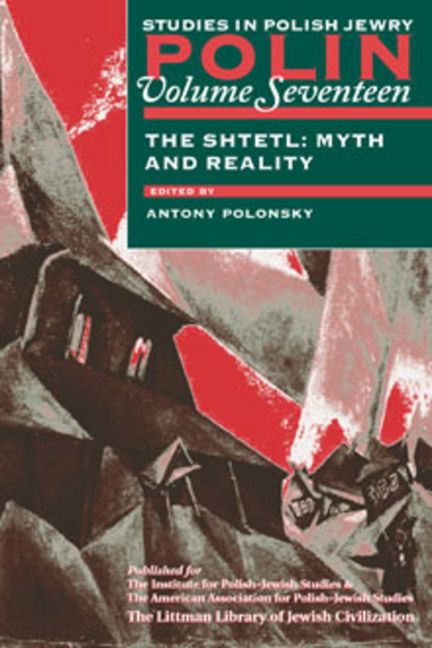Book contents
- Frontmatter
- Dedication
- Editors and Advisers
- Preface
- Polin
- Polin: Studies inPolish Jewry
- Contents
- Note on Place Names
- Note on Transliteration
- List of Abbreviations
- PART I THE SHTETL: MYTH AND REALITY
- PART II NEW VIEWS
- A Jewish Russifier in Despair: Lev Levanda's Polish Question
- Like a Voice Crying in the Wilderness: The Correspondence of Wolf Lewkowicz
- Jewish Prisoner Labour in Warsaw After the Ghetto Uprising, 1943–1944
- The Gęsiówka Story: A Little-Known Page of Jewish Resistance
- PART III DOCUMENTS
- PART IV THE SIXTY-FIFTH ANNIVERSARY OF EVENTS IN PRZYTYK: A DEBATE
- PART V REVIEWS
- OBITUARIES
- Notes on the Contributors
- Glossary
- Index
A Jewish Russifier in Despair: Lev Levanda's Polish Question
from PART II - NEW VIEWS
- Frontmatter
- Dedication
- Editors and Advisers
- Preface
- Polin
- Polin: Studies inPolish Jewry
- Contents
- Note on Place Names
- Note on Transliteration
- List of Abbreviations
- PART I THE SHTETL: MYTH AND REALITY
- PART II NEW VIEWS
- A Jewish Russifier in Despair: Lev Levanda's Polish Question
- Like a Voice Crying in the Wilderness: The Correspondence of Wolf Lewkowicz
- Jewish Prisoner Labour in Warsaw After the Ghetto Uprising, 1943–1944
- The Gęsiówka Story: A Little-Known Page of Jewish Resistance
- PART III DOCUMENTS
- PART IV THE SIXTY-FIFTH ANNIVERSARY OF EVENTS IN PRZYTYK: A DEBATE
- PART V REVIEWS
- OBITUARIES
- Notes on the Contributors
- Glossary
- Index
Summary
LEV LEVANDA (1835–88) is commonly regarded as a leading advocate of the Russification of the Jews of the Russian empire, but in fact his ethnic attitudes were far more complex and conflicting than this stereotype allows. One source of internal conflict was his ambivalence towards the Poles—a people unwillingly subjected to Russian rule and, like the Jews, often the object of Russian state oppression.
Levanda's writings on Poland (four novels, one historical study, and more than twenty short essays) appeared after and, I believe, in response to major defeats in his Russification programme. They constitute a kind of literary wishful thinking: unable to attain the goal of equal rights for Jews in the Russia of his time, Levanda searched the region's past for moments of harmony and integration between Jews and non-Jews. At the same time, he had a high regard for Polish literary culture, which had informed his development as a writer. His ‘Polish’ texts are part of a dialogue with his other writings, providing idealistic visions of a world he dreamed of creating but was unable to realize.
Vilna, the capital of Lithuania, was Levanda's home from the time he moved there in 1859 until his death in 1888. In 1875 the city had a total population of 82,668, of which the 37,909 Jews thus comprised nearly 46 per cent. In the 1860s Jews and certain non-Jews—mainly Lithuanian peasants, along with the smaller classes of Polish nobles and Russian administrators—were segregated socially. Contact was limited to business and administrative affairs. V. O. Garkavy, a Jewish intellectual, describes his experience as a youth in Vilna in the 1860s as follows:
Jewish life was sheltered from the outside world, thanks to the ‘ghetto’ even physically. Of course, there was interaction between Christians and Jews in daily life, but they were often related to business, and, of course, were restricted to the public sphere by preference. The Christian world appeared foreign and antagonistic, not so much because of the legal constraints upon us that emanated from it, but in particular because it threatened our spiritual world. Therefore, any novelty in dress or habits which came from that world seemed dangerous, and wearing German dress, a short frock, was considered a great sin and permitted only to merchants who had business abroad and in Moscow.
- Type
- Chapter
- Information
- The Shtetl: Myth and Reality , pp. 279 - 298Publisher: Liverpool University PressPrint publication year: 2004

